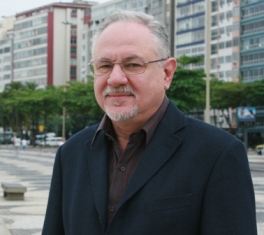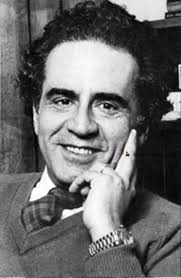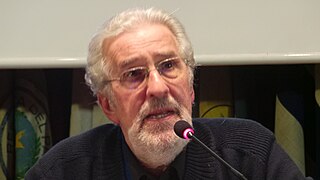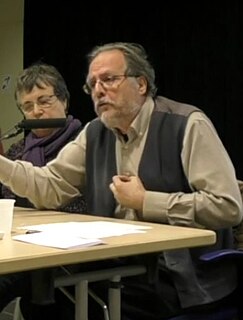Héctor Aguilar Camín is a Mexican writer, journalist and historian.

Andrés Oppenheimer is the editor and syndicated foreign affairs columnist with The Miami Herald, anchor of "Oppenheimer Presenta" on CNN En Español, and author of seven books, several of which have been published in English, Spanish, Portuguese and Japanese. His column, "The Oppenheimer Report," appears twice a week in The Miami Herald and more than 60 U.S. and international newspapers, including the Miami Herald, El Mundo of Spain, La Nación of Argentina, Reforma of Mexico, El Mercurio of Chile and El Comercio of Peru. He is the author of Saving the Americas and six other best-selling books, and is a regular political analyst with CNN en Español. His previous jobs at The Miami Herald included Mexico City bureau chief, foreign correspondent, and business writer. He previously worked for five years with The Associated Press in New York, and has contributed on a free-lance basis to The New York Times, The Washington Post, The New Republic, the BBC, CBS’ “60 Minutes”, and El Pais of Spain.
Roberto Laserna is a Bolivian and Spanish writer and economist who earned a PhD from the University of California, Berkeley in regional planning.

Gaucho literature, also known as gauchesco ("gauchoesque") style was a literary movement purporting to use the language of the gauchos, comparable to the American cowboy, and reflecting their mentality. Although earlier works have been identified as gauchoesque, the movement particularly thrived from the 1870s to 1920s in Argentina, Uruguay and south of Brazil after which the movement petered out, although some works continued to be written. Gauchoesque works continue to be read and studied as a significant part of Argentine literary history.

Dante Caputo was an Argentine academic, diplomat and politician, who served as the nation's foreign minister under President Raúl Alfonsín.
Arturo Andrés Roig was an Argentine philosopher.

Bernardo Sorj is a Brazilian social scientist, retired professor of Sociology at the Federal University of Rio de Janeiro. He is Director of The Edelstein Center for Social Research and of the Plataforma Democrática Project. He has published 30 books and more than 100 articles, on Latin American political development, international relations, the social impact of new technologies, social theory and Judaism.

Guillermo Alberto O'Donnell was a prominent Argentine political scientist, who spent most of his career working in Argentina and the United States, and who made lasting contributions to theorizing on authoritarianism and democratization, democracy and the state, and the politics of Latin America. His brother was the politician and writer Pacho O'Donnell.
Arnoldo Martínez Verdugo was a Mexican socialist politician and democracy activist. A long-standing leader of the Mexican Communist Party and the Unified Socialist Party of Mexico (PSUM), Martínez promoted political self-criticism, refused to support regional guerrilla movements, condemned the Soviet invasion of Czechoslovakia and promoted the unification of the political left.

Luis Alberto Alejandro Aparicio Lacalle Pou is a Uruguayan lawyer and politician serving as President of Uruguay since 1 March 2020. A member of the National Party, he is among the country's youngest presidents.

Carlos Martínez Gorriarán is a Spanish scholar, born in San Sebastián, Basque Country, Spain. After being a member of marxist and basque nationalist movements, he became one of the founding members and spokespersons of ¡Basta Ya! association and head of the Plataforma Pro from which the Union, Progress and Democracy (UPyD) party emerged in September 2007. In ¡Basta Ya! he was opposed to ETA, and also to the "obligatory nationalism" that he considered to be occurring in the Basque Country. He is a member of the Directing and Political counsels of the party.

Jorge Alberto Lozoya Legorreta is a Mexican diplomat with broad experience in international cooperation and cultural affairs. He has also been associated with some of the top Mexican and international academic institutions, with special interest on Asian civilizations and prospective studies and international negotiations.

Atilio Borón is an Argentine Marxist sociologist.
Manuel Antonio Garretón is a Chilean sociologist, political scientist and essayist. He received the National Prize for Humanities and Social Sciences in 2007 for his lifetime contribution to the field.

The Revolutionary Workers Party was a Trotskyist political party in Chile. It was founded in January 2017 and was the Chilean section of Trotskyist Fraction – Fourth International.

Alberto Zum Felde was a Uruguayan historian, critic and essayist.

Rosa Cobo Bedía is a Spanish feminist, writer, and professor of sociology of gender at the University of A Coruña. She is also the director of the Center for Gender Studies and Feminists at the same university. Her main line of research is feminist theory and the sociology of gender.

Fernando José "Ferran" Gallego Margaleff is a Spanish historian and writer.

María Julia Pou Brito del Pino, popularly known as Julita, is a Uruguayan politician and member of the National Party (Uruguay) (PN). Pou served in the Senate of Uruguay 2000 to 2005, as well as First Lady of Uruguay from 1990 until 1995. She is the wife of former President Luis Alberto Lacalle and the mother of President Luis Alberto Lacalle Pou, who took office on 1 March 2020.













